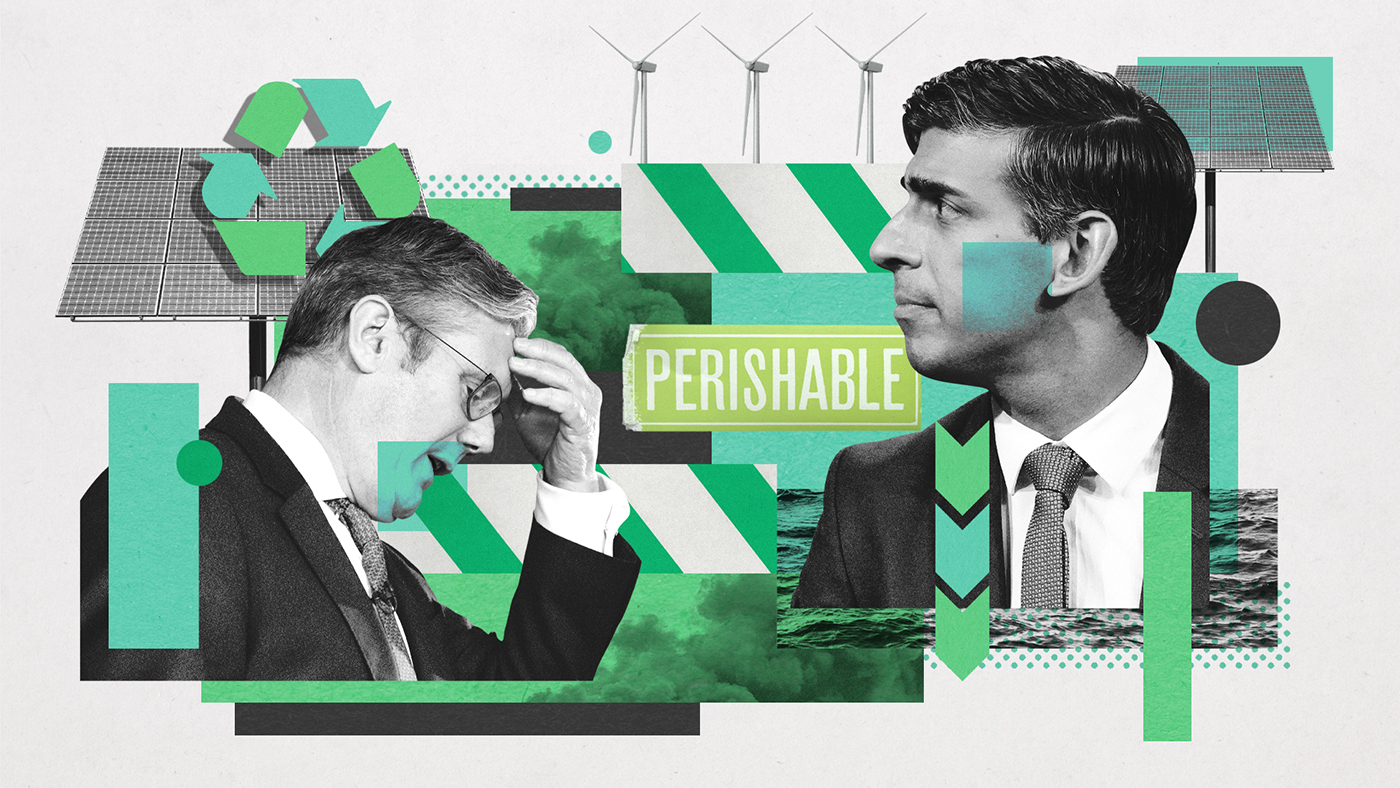Will Sunak and Starmer drop green policies to win voters?
Conservatives and Labour draw same conclusion from shock Uxbridge result but are warned move would be ‘political suicide’

A free daily email with the biggest news stories of the day – and the best features from TheWeek.com
You are now subscribed
Your newsletter sign-up was successful
Keir Starmer and Rishi Sunak could water down or even drop much of their green agenda, as both look to prioritise the economy in a bid to win voters ahead of the next general election.
Labour has spent the weekend arguing internally whether the shock loss of the Uxbridge and South Ruislip by-election means it has focused too much on green issues, after the Tories made the vote effectively a referendum on the expansion of the controversial ultra-low emission zone (Ulez) by Labour’s Mayor of London, Sadiq Khan.
A senior party figure told Politico’s London Playbook that Uxbridge should be a “wake-up call for those in Labour who think it is possible to ignore public opinion and still win … especially those who are driving anti-car policies and expecting their owners to dig deep into their pockets to pay for them”.
The Week
Escape your echo chamber. Get the facts behind the news, plus analysis from multiple perspectives.

Sign up for The Week's Free Newsletters
From our morning news briefing to a weekly Good News Newsletter, get the best of The Week delivered directly to your inbox.
From our morning news briefing to a weekly Good News Newsletter, get the best of The Week delivered directly to your inbox.
Another Labour MP put it more bluntly in electoral terms, arguing that 41 million driving licence holders in the UK “can’t be wrong”.
What did the papers say?
The Uxbridge result – in which Tory candidate Steve Tuckwell defied the polls to retain Boris Johnson’s old seat with a slim 495-vote majority – has laid bare tensions within both Labour and the Conservatives about the cost of environmental policies for those already facing a cost-of-living crisis.
“If you threaten people’s livelihoods and what they regard as fundamental rights to mobility and self-reliance, they will get rid of you,” argued Janet Daley in The Daily Telegraph. “This must be the end of Rishi Sunak’s green obsession,” the headline read.
The prime minister is said to be “reconsidering green policies which could see consumers out of pocket amid fears that they could be electorally damaging”, according to the i news site.
A free daily email with the biggest news stories of the day – and the best features from TheWeek.com
Sunak is planning to “hold firm on net-zero goals”, reported The Times, while “delaying or ditching a host of measures that would impose direct costs on consumers, as he comes under pressure from the right of his party to rethink Britain’s climate commitments”.
These could include adding a so-called “Aston Martin exception” to the petrol car ban due to come into force in 2030. This would give small carmakers more time to adapt to producing electric vehicles. Additional measures under consideration are dropping additional levies on energy bills and a halt to any new low-traffic neighbourhoods.
As for Labour, earlier this month The Sunday Times reported that Starmer and his allies had become increasingly unhappy that their economic focus was being jeopardised by the party’s eco-warriors. The party’s leader allegedly went as far as saying “I hate tree huggers” – something he has denied.
What next?
There is an argument, said The Spectator’s political editor Katy Balls, that the Uxbridge result “will make it easier for Starmer and his shadow chancellor Rachel Reeves to further tone down the green message” as the party looks to thrash out the details of its next manifesto.
Some Starmer allies also “see it as further reason to clip Ed Miliband’s wings – pointing to the risk of green backfiring if it looks costly” she added. As shadow climate change and net zero secretary, the former Labour leader is driving the party’s green agenda but reports suggest he has fallen out with Starmer and could even be at risk at the next shadow cabinet reshuffle expected in the autumn.
Tom Burke, co-founder of the green think tank E3G, predicted that those within Labour who are antagonistic to green measures will look to seize the moment. The Guardian’s environment editor Fiona Harvey pointed, for example, to “some trade unions who have deep reservations about the transition to a low-carbon economy, and some in the party are fearful over Tory attacks on climate policies”.
Sensing a small but fertile window of opportunity in the face of dire poll numbers, the Tories have sought to weaponise Labour’s green message as part of a wider culture war. Last week, energy secretary Grant Shapps branded Labour “the political wing of Just Stop Oil” and demanded it pay compensation for damage caused by the group’s protesters.
But, said Burke, the Labour leadership “should be very careful in generalising from this to climate policy more generally”. It was important, he said, to “communicate far more effectively what the consequences will be of climate policy failure. That’s what’s missing from this debate.”
With climate change consistently featuring among the top concerns for voters, and amid devastating wildfires in Greece and Switzerland and an extreme heatwave across southern Europe, both party leaders have been warned any attempt to veer away from their green pledges would be “political suicide”.
The Observer cited “senior figures from business, the scientific community and across the political divide” who said that any watering down of climate policies would be deeply unpopular with voters, set back the international fight to reach net zero and damage Britain’s green reputation.